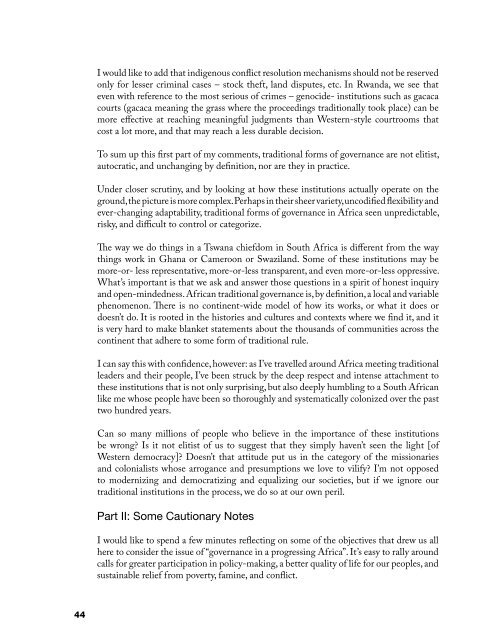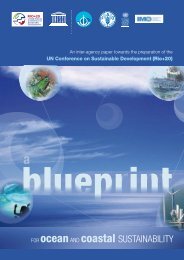Relevance of - United Nations Economic Commission for Africa
Relevance of - United Nations Economic Commission for Africa
Relevance of - United Nations Economic Commission for Africa
Create successful ePaper yourself
Turn your PDF publications into a flip-book with our unique Google optimized e-Paper software.
I would like to add that indigenous conflict resolution mechanisms should not be reserved<br />
only <strong>for</strong> lesser criminal cases – stock theft, land disputes, etc. In Rwanda, we see that<br />
even with reference to the most serious <strong>of</strong> crimes – genocide- institutions such as gacaca<br />
courts (gacaca meaning the grass where the proceedings traditionally took place) can be<br />
more effective at reaching meaningful judgments than Western-style courtrooms that<br />
cost a lot more, and that may reach a less durable decision.<br />
To sum up this first part <strong>of</strong> my comments, traditional <strong>for</strong>ms <strong>of</strong> governance are not elitist,<br />
autocratic, and unchanging by definition, nor are they in practice.<br />
Under closer scrutiny, and by looking at how these institutions actually operate on the<br />
ground, the picture is more complex. Perhaps in their sheer variety, uncodified flexibility and<br />
ever-changing adaptability, traditional <strong>for</strong>ms <strong>of</strong> governance in <strong>Africa</strong> seen unpredictable,<br />
risky, and difficult to control or categorize.<br />
The way we do things in a Tswana chiefdom in South <strong>Africa</strong> is different from the way<br />
things work in Ghana or Cameroon or Swaziland. Some <strong>of</strong> these institutions may be<br />
more-or- less representative, more-or-less transparent, and even more-or-less oppressive.<br />
What’s important is that we ask and answer those questions in a spirit <strong>of</strong> honest inquiry<br />
and open-mindedness. <strong>Africa</strong>n traditional governance is, by definition, a local and variable<br />
phenomenon. There is no continent-wide model <strong>of</strong> how its works, or what it does or<br />
doesn’t do. It is rooted in the histories and cultures and contexts where we find it, and it<br />
is very hard to make blanket statements about the thousands <strong>of</strong> communities across the<br />
continent that adhere to some <strong>for</strong>m <strong>of</strong> traditional rule.<br />
I can say this with confidence, however: as I’ve travelled around <strong>Africa</strong> meeting traditional<br />
leaders and their people, I’ve been struck by the deep respect and intense attachment to<br />
these institutions that is not only surprising, but also deeply humbling to a South <strong>Africa</strong>n<br />
like me whose people have been so thoroughly and systematically colonized over the past<br />
two hundred years.<br />
Can so many millions <strong>of</strong> people who believe in the importance <strong>of</strong> these institutions<br />
be wrong? Is it not elitist <strong>of</strong> us to suggest that they simply haven’t seen the light [<strong>of</strong><br />
Western democracy]? Doesn’t that attitude put us in the category <strong>of</strong> the missionaries<br />
and colonialists whose arrogance and presumptions we love to vilify? I’m not opposed<br />
to modernizing and democratizing and equalizing our societies, but if we ignore our<br />
traditional institutions in the process, we do so at our own peril.<br />
Part II: Some Cautionary Notes<br />
I would like to spend a few minutes reflecting on some <strong>of</strong> the objectives that drew us all<br />
here to consider the issue <strong>of</strong> “governance in a progressing <strong>Africa</strong>”. It’s easy to rally around<br />
calls <strong>for</strong> greater participation in policy-making, a better quality <strong>of</strong> life <strong>for</strong> our peoples, and<br />
sustainable relief from poverty, famine, and conflict.<br />
44
















